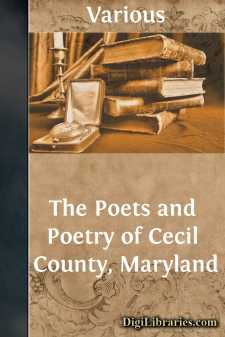Categories
- Antiques & Collectibles 13
- Architecture 36
- Art 48
- Bibles 22
- Biography & Autobiography 813
- Body, Mind & Spirit 142
- Business & Economics 28
- Children's Books 15
- Children's Fiction 12
- Computers 4
- Cooking 94
- Crafts & Hobbies 4
- Drama 346
- Education 46
- Family & Relationships 57
- Fiction 11829
- Games 19
- Gardening 17
- Health & Fitness 34
- History 1377
- House & Home 1
- Humor 147
- Juvenile Fiction 1873
- Juvenile Nonfiction 202
- Language Arts & Disciplines 88
- Law 16
- Literary Collections 686
- Literary Criticism 179
- Mathematics 13
- Medical 41
- Music 40
- Nature 179
- Non-Classifiable 1768
- Performing Arts 7
- Periodicals 1453
- Philosophy 64
- Photography 2
- Poetry 896
- Political Science 203
- Psychology 42
- Reference 154
- Religion 513
- Science 126
- Self-Help 84
- Social Science 81
- Sports & Recreation 34
- Study Aids 3
- Technology & Engineering 59
- Transportation 23
- Travel 463
- True Crime 29
The Poets and Poetry of Cecil County, Maryland
by: Various
Description:
Excerpt
Lines
Sing on, sweet feathered warbler, sing!
Mount higher on thy joyous wing,
And let thy morning anthem ring
Full on my ear;
Thou art the only sign of spring
I see or hear.
The earth is buried deep in snow;
The muffled streams refuse to flow,
The rattling mill can scarcely go,
For ice and frost:
The beauty of the vale below
In death is lost.
Save thine, no note of joy is heard—
Thy kindred songsters of the wood
Have long since gone, and thou, sweet bird,
Art left behind—
A faithful friend, whose every word
Is sweet and kind.
But Spring will come, as thou wilt see,
With blooming flower and budding tree,
And song of bird and hum of bee
Their charms to lend;
But I will cherish none like thee,
My constant friend.
Like the dear friends who ne’er forsake me—
Whatever sorrows overtake me—
In spite of all my faults which make me
Myself detest,
They still cling to and kindly take me
Unto their breast.
An Eastern Tale
A Persian lady we’re informed—
This happened long, long years before
The Christian era ever dawned,
A thousand years, it may be more,
The date and narrative are so obscure,
I have to guess some things that should be sure.
I’m puzzled with this history,
And rue that I began the tale;
It seems a kind of mystery—
I’m very much afraid I’ll fail,
For want of facts of the sensation kind:
I therefore dwell upon the few I find.
I like voluminous writing best,
That gives the facts dress’d up in style.
A handsome woman when she’s dressed
Looks better than (repress that smile)
When she in plainer costume does appear;
The more it costs we know she is more dear.
The story is a Grecian one,
The author’s name I cannot tell;
Perhaps it was old Xenophon
Or Aristotle, I can’t dwell
On trifles; perhaps Plutarch wrote the story:
At any rate its years have made it hoary.
The Greeks were famous in those days
In arts, in letters and in arms;
Quite plain and simple in their ways;
With their own hands they tilled their farms;
Some dressed the vine, some plow’d the ocean’s wave;
Some wrote, were orators, or teachers grave.
They were Republicans, in fact;
The Persians might have called them “black
Republicans;” they never lacked
The power to beat a foeman back.
Thermopylæ, so famed in Grecian story
Is but another name for martial glory.
A busy hive to work or fight,
Like our New England bold and strong;
A little frantic for the right,
As sternly set against the wrong;
And when for right they drew the sword, we know,
Stopped not to count the number of the foe.
To me it is a painful sight
To see a nation great and good
Reduced to such a sorry plight,
And courtiers crawl where freemen stood,
And king and priests combine to seize the spoil,
While widows weep and beggar’d yeomen toil.
The philosophic mind might dwell
Upon this subject for an age:
The philanthropic heart might swell
Till tears as ink would wet the page;
The mystery, a myst’ry will remain—
The learning of the learned cannot explain....












